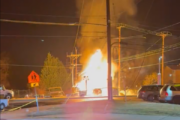A House committee voted Tuesday to send the D.C. statehood bill to the House Floor. The proposal passed 21-16.
For the first time since 1993, a House committee marked up a proposal to make D.C. the 51st U.S. state.
The House Committee on Oversight and Reform debated HR 51, the D.C. Admission Act on Tuesday. One of the main arguments against statehood had to deal with opponents’ belief that admitting D.C. would require a constitutional amendment.
Many, including Rep. Jim Jordan, R-Ohio, mentioned during the hearing Founding Father James Madison’s words in 1788, which argued that the national capital needed to be distinct from the states.
Supporters repeatedly argued that the 700,000 D.C. residents are disenfranchised and excluded from representation.
“We’re the only nation on earth where the residents of the capital city are disenfranchised in the national legislature,” said Rep. Jamie Raskin, D-Md. “Can you imagine if the people in Paris, France, were disenfranchised in the National Assembly? You would have another French Revolution on your hands.”
Raskin also argued that states have all been admitted by an Act of Congress, not a constitutional amendment.
Ahead of the hearing, D.C. leaders asked residents to show up and support the bill.
“Fill the United States Congress with D.C. residents who demand D.C. statehood,” said D.C. Mayor Muriel Bowser during a news conference the night before the markup session.
Bowser said the District has been locked out of the national conversation because it doesn’t have members of Congress who can vote on the city’s behalf.
D.C. Del. Eleanor Holmes Norton, who has led the charge for statehood for many years and who is a member of the Oversight Committee, was in attendance to defend the bill.
“The residents of the District of Columbia do not particularly enjoy paying billions and millions of dollars annually to support the federal government without the representation their taxes have purchased,” Norton said.
House Oversight Committee Chair Carolyn Maloney, D-NY, called Norton not only the author of this legislation but also of this moment in history.
In the past, Republicans on the committee have raised concerns about the city becoming a state, which included a call last year to delay further discussion on the bill in light of the ethics scandal involving former Ward 2 Councilman Jack Evans.
D.C. Council President Phil Mendelson had expected that there will be arguments from Republican members of the committee against statehood. Among those they mentioned included reports of corruption in the city government and the D.C. financial crisis back in 1995.
“I look forward to hearing the debate about why we shouldn’t have statehood because of parking, or we shouldn’t have statehood because sometimes we have elected officials with ethical issues, as if somehow that’s unique to the District of Columbia,” Mendelson said.
He said the District is in better financial shape than most cities and states, but said the need for congressional oversight for decisions has prevented D.C. from beginning public-private partnerships, amending jury service laws or modifying small claims court rules.
“And it’s time that we get away from that, we get out from under that and that’s what the vote (Tuesday) and statehood is about,” Mendelson said.
When the hearing on the legislation was completed, history was made.
“We’ll mark up and, importantly, we’ll vote on HR 51 to send our D.C. statehood bill to the House floor,” Norton said.
She said top-ranking members of the Democrat-controlled House have given their support of the bill. Norton feels, by the end of this year, the bill will receive a successful full House vote.
In 1993, it was a full House vote which ended that year’s effort for statehood. If the bill does pass the House, it would then need to make it through the Republican-controlled Senate.
It is also unclear if President Donald Trump would sign off on the bill, if it were to make it to his desk.









